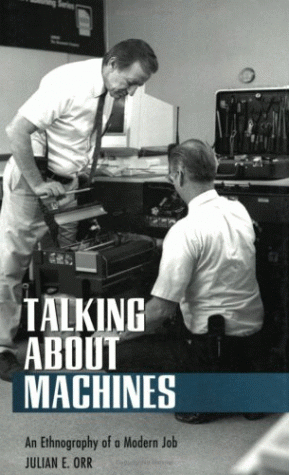- Home
- Articles
- Reviews
- About
- Archives
- Past Issues
- The eLearn Blog
Archives
| To leave a comment you must sign in. Please log in or create an ACM Account. Forgot your username or password? |
|
Create an ACM Account |

Julian Orr's Talking About Machines: An Ethnography of a Modern Job was first available in 1990 as an unpublished doctoral dissertation and was published for a wider readership in 1996. An anthropologist, Orr embedded himself in a California-based community of photocopier repair technicians (which he refers to as an "occupational community" and "work community"). In addition to observing the technicians executing their daily job tasks, Orr also watched as the technicians, in the face of inadequate repair manuals and training, frequently gathered in an unstructured and unsupervised space to discuss particular repair problems and solutions. Often the technicians, even as they successfully repaired machines, operated at philosophical odds with management. While management wanted the repair technicians to closely follow manuals and troubleshooting documentation—even if it meant machines were not fixed—the technicians often circumvented the manuals and established protocols to achieve repair. A critical aspect of the technicians' behaviors was what Orr describes as operating from the self-identity of heroic troubleshooter, a view of their work as undergoing something of a noble quest to find a solution and fix a machine in the face of constraints and bad information. This is especially significant as so much later work in situated learning and communities of practice would address issues of identity as related to enacting practice.
Orr's work has proven influential (subsequent authors have used Orr's work as the basis for their further conceptual work, including Brown and Duguid, 1991; Brown, 1998; and Contu and Willmott, 2003). While Orr's work is widely regarded as an exemplar of workplace ethnography, and influential for forthcoming research in situated learning, it is important to note that Orr did not set out to study "situated learning" or "communities." His intent was descriptive: "to present the work of the technicians and to use it to suggest what may be learned from studies of work practice in contrast to more abstracted ways of writing about work" (Orr, 2006, p. 1816); his concern was not primarily with studying learning but with studying the context in which work occurs, what he called "situated practice" (1996, p. 10). The relationships within Orr's technician group differed from Jean Lave's apprentices and their masters, where novice workers became more expert by interacting with and working alongside experts who were primarily interested in replicating or "passing along" existing knowledge. In contrast, the repair technicians existed largely as peers working together to develop and share new knowledge.
Orr's 1990 study culminated in a richly detailed description of work. While his intent was different, his study connects to the work of situated learning researchers by providing evidence that knowledge and practice are tightly linked. In learning about work practice rather than writing in abstracted ways about work, Orr found that much of what we might call "learning" occurs through informal relationships and interactions; that management seems to have very little understanding of the work it seeks to control, that worker view of the job (to fix machines) is frequently different from that of management (to fix machines using documentation), and that overreliance on notions of espoused practice can obscure management's view of actual practice. He also reported that work is narrative: Storytelling and relating anecdotes are a legitimate form of knowledge sharing and contributor to problem solving, and part of the work, not an addition to it; and as with the example of storytelling, much of work is tacit and situational, requiring improvisation. These findings would have influence on subsequent conceptual work on situated learning and the emerging interest in communities of practice. Ideas of informal relationships and interactions, storytelling and knowledge sharing, and the nature of tacit knowledge and improvisation would later figure in to Wenger's 1998 work on communities of practice and are useful now as we enter a world filled with new possibilities for rich online networks mediated by ever-evolving, increasingly robust social media tools.
Review adapted from Bozarth, J. The Usefulness of Wenger's Framework in Understanding a Community of Practice. Dissertation. North Carolina State University, 2008.
Orr, J. Talking about Machines: An Ethnography of a Modern Job. Cornell University Press, 1996.
Orr, J. Ten Years of Talking About Machines. Organization Studies 27, 12 (2006): 1805-1820
|
To leave a comment you must sign in. |
|
Create an ACM Account. |